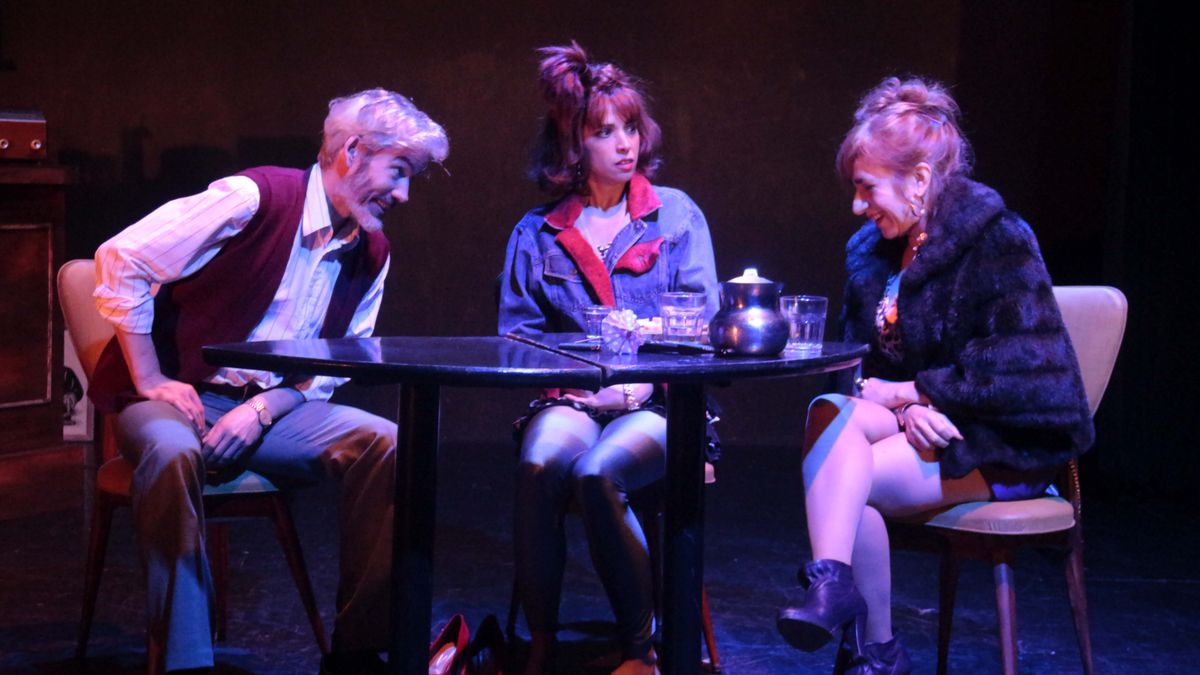“As Enrique Pinti said, this is a country with hiccups. In the work you can see how what happened at the end of the 80s seems to be repeating itself today,” says Karina K, who premieres for the first time a work written by her, “The port of glory”, with performances by Maby Salerno, Marta Mediavilla and Ezequiel Cipols, which debuts on Sunday at 8pm on El Extranjero.
The work contains winks and references to our Argentine idiosyncrasy, which through the decades repeats mistakes and feats. We talked with Karina K, author and director of this work.
Journalist: How did you get into writing?
Karina K: I always did it, when I started doing theatre I wrote the texts for my own characters. But it was in 2018 when I did Juan José Campanella’s text-based play, more of a musical theatre or café concert or variety show, and I felt that “What do we do with Walter” was so good that it made me want to train to write. From that year until today I have been writing and I have several works, this is the port, the starting point.
Q: How did this little bar appear in Mar del Plata and why the 80s?
KK: The idea for the little bar came from the image of a photo where you can see a woman sitting at a bar, with a round table, a whiskey, pensive. Behind it there is a huge ship, like a cruise ship, so I adapted it to the port of Mar del Plata and to this café called Perla Mar, in relation to a seedy hotel I knew in that city. Since the bar is in decline, I transferred the decadence of that cheap hotel to this café that in the late 80s is in decline due to hyperinflation. I started to write and when in 2023 I did a season in Mar del Plata I went around all the places, there I finished writing. Instead of going to the beach, which I am not very fond of, I took advantage and stayed writing before doing the performance. I rode my bike around all the places in the port, the geography, and getting into it I met people in that neighborhood that has so much identity. I was also interested in the fact that there were no cell phones or technology at that time, that the characters looked into each other’s eyes, it draws a portrait of the era and how we lived, the sounds of those times.
Q: You talk about illusions, dreams, what other topics are there?
KK: For me, dreams and illusions can be compared to decisions and oaths. An oath is stronger than a decision, and a dream is stronger than an illusion, which if it does not have enough substance remains a mirage, whereas a dream, when it has courage and determination, is more likely to be achieved. It can also weaken along the way, and that is what the work talks about. We are talking about an Argentine idiosyncrasy that keeps repeating itself, about that historical context of the late 80s and it is repeating itself now. Decades go by and there is a replication of situations, of positive and negative aspects of the country. Achievements and failures, as the great Enrique Pinti said, this is a country with hiccups.
Q: What are those characters like?
KK: One is the owner of the bar, Jorge, who is trying to sustain his business as much as possible but knows that at any moment it will close due to the crisis. He is a friend of Gloria, an older prostitute, a regular, and they both have a very deep dialogue about life. She is going through an existential crisis, the years go by and nothing is the same as before, she does not see her future. The other is Dorita, a younger prostitute who arrives with energy and is not aware that her future is a house of cards. There is a conflict and at one point a healing, transforming shock occurs, they tell each other everything and then the calm comes with the dialogues from the heart.
Q: How did you conceive the staging?
KK: It was very important to be in the physical space where I wrote the play and walk those little streets. I imagined the staging from the writing. I made many videos and photos and the staging was very natural, organic, it started in my head and was transferred to the theater.
Q: What is it like to direct your own material?
KK: I have never read a play as much as I read my own, so I know the dialogues and when I transmit them to the actors I do so with the sensorial knowledge of having constructed them. The actors end up doing the play, that was a great learning experience, the amount of dialogues I took out because they were not necessary thanks to the expression of the actors, everything was said and it was like going over the top.
Q: How do you see theatre and culture?
KK: As a space of resistance. It has been like this for years, but today more than ever, one cannot depend on others to achieve one’s goals. This work is possible thanks to desire, determination, love of theatre and telling stories that leave one reflecting, that is what I care about in theatre. With the effort it implies, I am risking everything, I am producing it because in this situation without subsidies I either sit back and do nothing or use my savings to make art and see how capable I am of achieving my dreams.
Source: Ambito
I am an author and journalist who has worked in the entertainment industry for over a decade. I currently work as a news editor at a major news website, and my focus is on covering the latest trends in entertainment. I also write occasional pieces for other outlets, and have authored two books about the entertainment industry.



